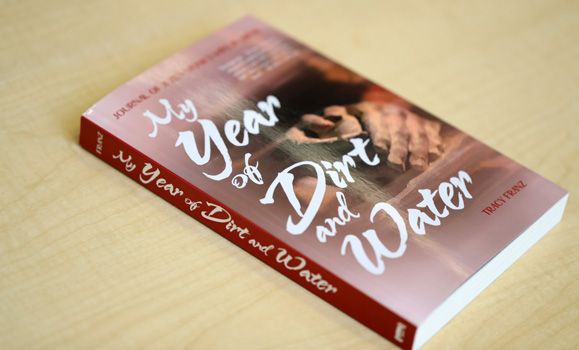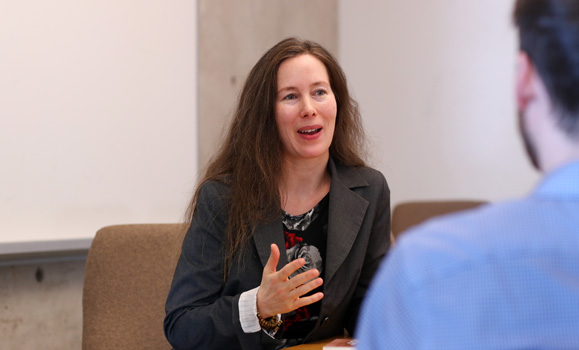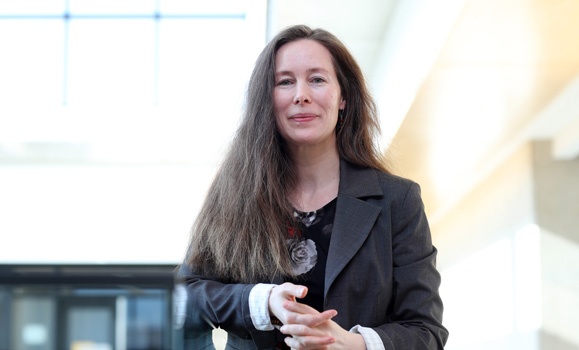When the New York Times described the writing in Tracy Franz’s memoir, My Year of Dirt and Water, as “elegantly understated journal entries, each with a satisfying heft, like a rustic wabi-sabi tea bowl” last summer, it was a flattering nod to the book’s original source material.
For years, the Alaskan-born writer — who now daylights as a teacher in Dal’s English as a Second or Additional Language (ESL) program in the College of Continuing Education — had carted a motley assortment of notes, journals and computer files about some of her experiences living in Japan from place to place.
“It was not a nice little notebook or anything like that. It was all over the place,” says Franz. “I had this huge pile of stuff, and I just carried it with me overseas, back and forth.”

Franz and her husband, Koun, moved six times between 1999 and 2013, with three extended stays in Japan — including a four-year stint that featured a year she spent alone there while her husband trained in a Buddhist monastery following his ordainment as a Zen monk.
Shortly after the couple settled in Halifax in 2013 with their two young children, Franz decided it was finally time to wrangle the scattered notes about that particular year, 2004, into a book.
The result is a memoir that’s been widely celebrated for its honest and insightful take on everything from being a foreigner living in Japan to the nature of love and the burden of suffering.
“I think I always knew that I would write a book about that year because I entered it really paying attention,” she says.
Discovering new experiences
Faced with an extended absence from her Montana-born husband, who she saw only on occasional formal visits, Franz threw herself into her work as an English teacher and studied Japanese.
She also took up pottery making, which is where her book’s title came from.
“I wanted to do some sort of traditional Japanese art,” she says, “and that one was very interesting to me, and it was also nice because it allowed me to join a small group of Japanese women. It was wonderful to be a part of that."
Franz was also fascinated by the mastery culture of pottery that emphasized practicing the same thing over and over again. She turned cup after cup and bowl after bowl, failing often, but also having some glimmers of success. Unlike the notes she carried with her over the years, Franz kept very little pottery. Most she gave away. Only a few pieces made it all the way to Halifax, including a couple from her teacher — all still in use today.
“I love that about pottery; it’s utilitarian art,” she says.

Franz learned about a lot more than just language and pottery that year, though, and carries some of those deeper life lessons from 15 years ago with her today as well. She says the book is “kind of the history of Koun and I, how we became adults.”
“I think we figured out a lot of things that year. It was a scary time in some ways, but we learned a lot,” she adds.
The book also offered Franz a chance to chronicle some of the other personal issues she faced during the year, including her mother’s cancer diagnosis and her efforts to confront difficult trauma she faced growing up. The book covers these experiences as she travels home to Alaska twice during the year. When Franz decided to write the book, she let family members know she was going into it “to tell the truth,” even though she knew it would be stressful. She says her family has been very supportive of the project.
Raves and faves
With the memoir now out in the world, Franz has been thrilled to see it so well received.
In addition to the positive Times review last summer, it was also named a New York Times Book Review Editors’ Choice Selection and has received praise from The Japan Times, The Literary Review, and other publications.
It’s also brought her further attention from the literary world. She is currently in the process of writing another book — this time a still-under-wraps work of fiction.
One constant throughout all Franz’s moves since graduate school has been her work as a teacher.
“I’ve always been teaching reading and writing at some level,” she says.
That experience gave her a leg up when she and Koun arrived in Halifax, where the latter was starting a job as an editor and writer with Buddhadharma magazine and serving as Resident Priest for Zen Nova Scotia. Franz did a short stint at the Writing Centre at Dal before joining the ESL program in 2014, where she has been ever since.
With growing children, the decision came to put down roots and Halifax seemed like a “wonderful town” in which to do so, says Franz.
“It worked out,” she says. “This is the longest period of time that we’ve just stayed put.”

